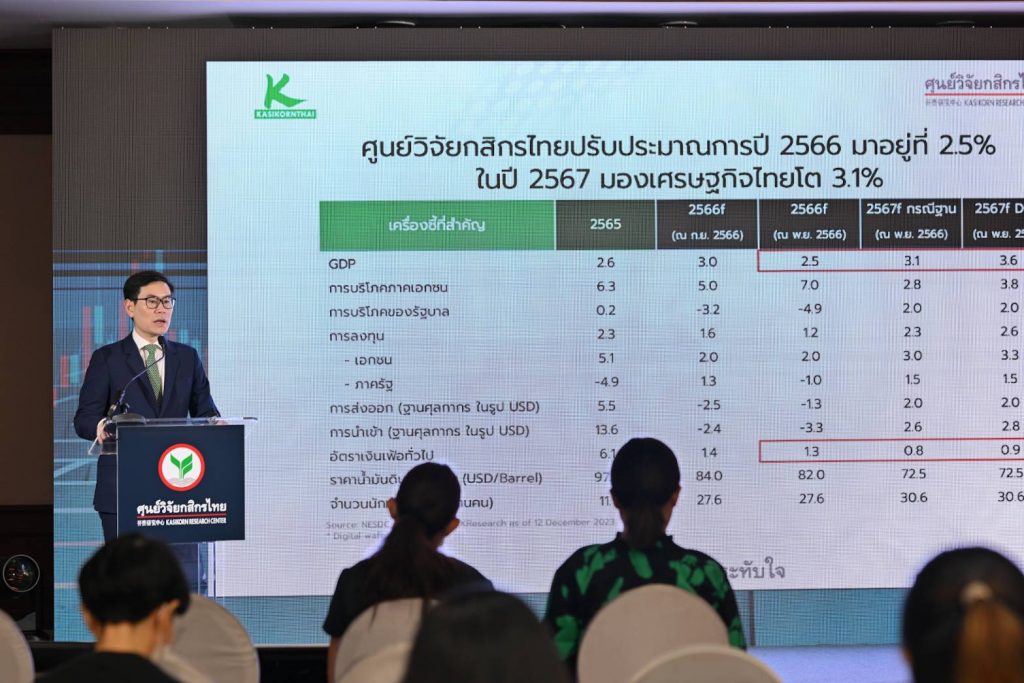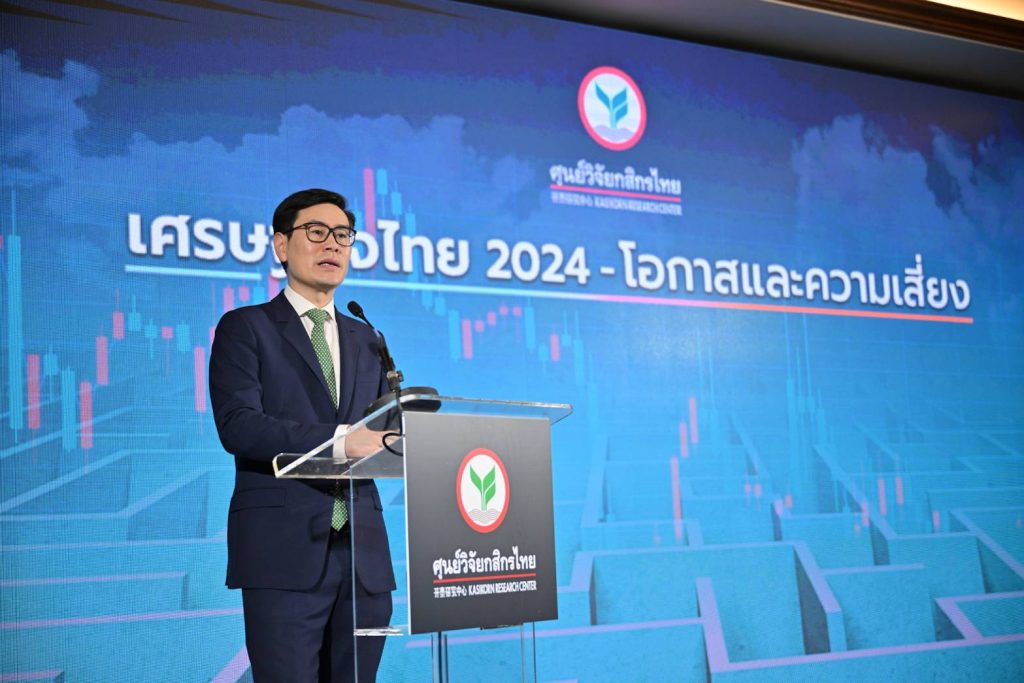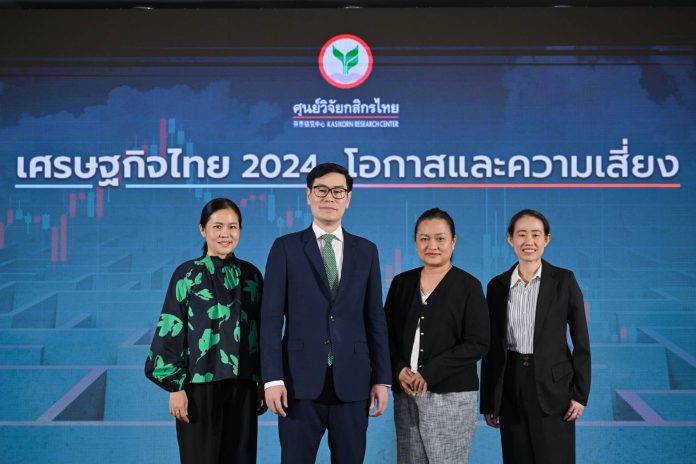ศูนย์วิจัยกสิกรไทย ปรับลดประมาณการเศรษฐกิจไทยปี 2566 ลงมาอยู่ที่ 2.5 % จาก 3.0% เนื่องจากเศรษฐกิจไทยยังได้รับผลกระทบจากการที่เศรษฐกิจโลกชะลอตัว โดยเฉพาะเศรษฐกิจจีนที่ยังคงเผชิญกับปัญหาในภาคอสังหาริมทรัพย์อยู่

นายบุรินทร์ อดุลวัฒนะ กรรมการผู้จัดการ และ Chief Economist บริษัท ศูนย์วิจัยกสิกรไทย จำกัด เปิดเผยว่า เศรษฐกิจโลกยังชะลอตัวต่อเนื่อง ส่งผลกระทบกับการค้าโลก สะท้อนจากภาคการผลิตที่ชะลอตัวทั่วโลก โดยเฉพาะอย่างยิ่งเศรษฐกิจจีนและเศรษฐกิจเยอรมนีที่พึ่งพาการส่งออกสูง นอกจากนั้น จีนยังคงเผชิญกับปัญหาด้านอสังหาริมทรัพย์ ส่งผลลบกับอุปสงค์ภายในประเทศ ในขณะที่ธนาคารกลางสหรัฐฯ (เฟด) ยังประเมินว่าเศรษฐกิจที่ยังขยายตัวได้ดีอยู่ ส่งผลให้เฟดมีแนวโน้มที่จะคงดอกเบี้ยไว้ที่ระดับสูงในปี 2567 ถึงแม้ว่าตลาดการเงินมองว่ามีโอกาสที่เฟดจะเริ่มลดดอกเบี้ยนโยบายได้ในช่วงครึ่งปีแรกของปี 2567

ทั้งนี้ เศรษฐกิจไทยมีแนวโน้มโตต่ำกว่าคาด โดยศูนย์วิจัยกสิกรไทยได้ปรับลดประมาณการเติบโตของเศรษฐกิจไทยปี 2566 ลงมาอยู่ที่ 2.5% จาก 3.0% จากการที่เศรษฐกิจโลก โดยเฉพาะเศรษฐกิจจีนยังชะลอตัวต่อเนื่อง ส่งผลกระทบกับจำนวนนักท่องเที่ยวที่มองว่าจะเข้ามาเพียง 27.6 ล้านคนในปี 2566 และถึงแม้ว่าการส่งออกสินค้าที่จะหดตัวน้อยกว่าที่เคยประเมินไว้ที่ -1.3% (จาก -2.5%) นอกจากนี้ อุปสงค์ในประเทศยังคงได้รับผลจากการที่การท่องเที่ยวยังไม่ฟื้นตัวเต็มที่ รวมถึงภาคการผลิตที่ยังชะลอต่อเนื่อง และหนี้ครัวเรือนที่อยู่ในระดับสูง สะท้อนได้จากยอดขายรถยนต์ในประเทศที่ยังหดตัวหลายเดือนติดต่อกันและเงินเฟ้อพื้นฐานที่ปรับตัวต่ำกว่ากรอบเงินเฟ้อของ ธปท. และศูนย์วิจัยกสิกรไทยคาดว่า ธปท. ได้สิ้นสุดวัฎจักรดอกเบี้ยขาขึ้นไปแล้วที่ 2.5%

ในปี 2567 เศรษฐกิจไทยมีแนวโน้มขยายตัวที่ 3.1% จากภาครัฐบาลทั้งทางการลงทุนและการบริโกค และการส่งออกสินค้าที่คาดว่าขยายตัว 2% รวมถึง จำนวนนักท่องเที่ยวที่น่าจะเพิ่มขึ้นไปอยู่ที่ 30.6 ล้านคน จาก 27.6 ล้านคนในปี 2566 และหากรวมกับมาตรการ Digital Wallet คาดว่าเศรษฐกิจไทยจะโตได้ 3.6% ส่วนประมาณการอัตราเงินเฟ้ออยู่ที่ระดับ 0.8% จากราคาน้ำมันที่มองว่าปีหน้าจะมีค่าเฉลี่ยที่ 72.5 ดอลลาร์ฯ ต่อบาร์เรล
ในบริบทที่การค้าโลกมีนโยบายกีดกันการค้ายังเข้มข้นอยู่ และอุตสาหกรรมรถยนต์ที่กำลังเกิดการเปลี่ยนแปลงจากรถยนต์ไฟฟ้าที่ได้รับความนิยมมากขึ้น จะก่อให้เกิดโอกาสที่ประเทศไทยจะพัฒนาเป็นศูนย์กลางของการผลิตรถยนต์ไฟฟ้าของภูมิภาคได้ และการที่ประเทศไทยน่าจะได้รับอานิสงส์จากการย้ายฐานการผลิตในอุตสาหกรรมอื่นๆ อาทิเช่นกลุ่มอิเล็กทรอนิกส์ จะทำให้เรามีเครื่องจักรใหม่ๆ ในการขับเคลื่อนเศรษฐกิจในอนาคตอันใกล้

KResearch forecasts Thai economic growth of 3.1 percent in 2024, potentially reaching 3.6 percent if the digital wallet measure is implemented
KASIKORN RESEARCH CENTER (KResearch) has slashed its Thai economic growth projection for 2023 to 2.5 percent from the previous forecast of 3.0 percent. The downgrade is due to impacts of the persistent global economic slowdown, especially the faltering Chinese economy amid property woes.
Mr. Burin Adulwattana, Managing Director and Chief Economist, KASIKORN RESEARCH CENTER Co., Ltd. (KResearch), said, “The global economy is slowing down, impacting global trade. This is reflected in the deceleration of the manufacturing sector worldwide, especially in China and Germany, which are both heavily reliant on exports. In addition, the Chinese economy remains hindered by its ailing property sector, which has hurt domestic demand. Meanwhile, the US Federal Reserve (Fed) has assessed that the US economy remains in good shape, which means the Fed is likely to keep interest rates high in 2024. However, the financial market sees a chance that the Fed may start cutting its policy rate during the first half of 2024.”
The Thai economy is projected to grow slower than expected in 2023. KResearch, therefore, has downwardly revised our growth forecast for the Thai economy in 2023 to 2.5 percent, from the previous estimate of 3.0 percent, due to the global economic downturn. The steady decline in the Chinese economy, in particular, may affect the overall number of international tourist arrivals in Thailand. KResearch is of the view that the total number of foreign holidaymakers in Thailand during 2023 may reach only 27.6 million, although Thai merchandise exports are projected to contract by 1.3 percent, an improvement from our previous estimate of a 2.5-percent decline. Additionally, domestic demand may continue to be affected by the fact that Thai tourism has not yet fully recovered, together with the persistent slowdown in the manufacturing sector and hefty household debt, as reflected in the contraction of domestic car sales for several consecutive months and core inflation that remains below the Bank of Thailand’s target. KResearch expects that the Thai central bank has already ended its interest hike cycle, leaving its policy rate at 2.5 percent.
In 2024, the Thai economy is projected to grow 3.1 percent, thanks to public investment and consumption, plus projected growth in merchandise exports of 2.0 percent. Moreover, the number of international tourist arrivals may increase to 30.6 million, from the 27.6 million projected for 2023. If the Thai government’s digital wallet measure goes ahead, it is expected that the Thai economy would grow by 3.6 percent. The inflation rate may stay at 0.8 percent in 2024 as global oil prices are projected to average USD 72.5 per barrel.
In the context where global trade protectionism remains evident, and the automotive industry is in a transition due to the increasing popularity of electric vehicles (EVs), Thailand has the opportunity to develop as a regional EV production hub. Additionally, as the country is likely to benefit from the relocation of manufacturing bases in other industries, such as electronics, this would result in new mechanisms to drive the economy in the near future.


































































